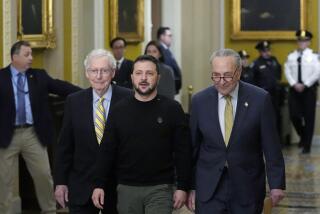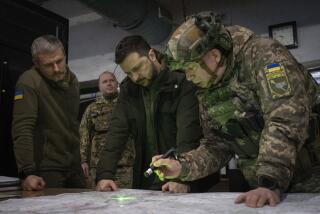Gorbachev Appeals for Massive Western Help : Soviet Union: He says it’s vital to ensure the success of reforms and to tide the nation through the next 2 years.
- Share via
MOSCOW — President Mikhail S. Gorbachev appealed Thursday for massive Western assistance to ensure the success of perestroika and to get the Soviet Union through the next two years as it establishes a market economy.
“We need this help, especially for these two crucial years when we will have to make the most difficult changes,” Gorbachev said in his most direct plea yet for economic assistance. “And we need it, of course, within the present year.”
Some aid is required immediately, he continued, “to reduce the acuteness of the problems and so that perestroika does not lose momentum.”
While he cited no direct figures for Soviet needs, he compared the Soviet Union to countries that have borrowed as much as $40 billion to finance their economic development and implied that Moscow might need as much.
“We are not the country that would not survive after borrowing 20 billion (dollars) or 40 billion,” Gorbachev said. “There are countries, a tenth our size, that easily absorb 20, 30 or 40 billion.”
The Soviet president was speaking at a news conference at the end of a two-day visit to Moscow by Italian Prime Minister Giulio Andreotti, the current president of the European Community, which is considering proposals for extensive assistance to the Soviet Union.
Although no agreements were reached on increased European or Italian assistance during the talks, Andreotti said that the success of perestroika, as Gorbachev’s political, economic and social reforms are known, is as vital to the West and the rest of the world as it is to the Soviet Union.
As the Soviet economic crisis has deepened in recent months, Gorbachev has begun to look increasingly for short- and medium-term assistance from the West, whose response has varied from proposals from West Germany and France of large-scale help of $15 billion to $20 billion to great caution by the United States, Britain and Japan.
“We are not looking for charity,” Gorbachev said Thursday. “It should be clear that this (help) would not be a handout. We must return it. Our people would not accept help under those conditions. This would be insulting for them. This assistance must be repaid.”
Gorbachev had written confidentially to President Bush, British Prime Minister Margaret Thatcher, West German Chancellor Helmut Kohl and other Western leaders earlier this month, outlining Soviet needs for financial and technical assistance as well as his plans for economic reforms.
In his comments Thursday, however, there was a new urgency as well as a strengthened resolve to press ahead with the transition to a market economy.
He quickly ticked off a series of new laws, presidential decrees and governmental decisions that will be promulgated in the next two to three months to establish the basis for what is formally known here as “a regulated market economy.”
Among those measures would be broad laws on commercial activity, more specific legislation on banking, foreign investment, land reform and improvement of the credit system. A committee also would be established to oversee the privatization of many state-owned enterprises.
But Gorbachev’s apparent willingness to borrow extensively appeared to signal a policy change--one that possibly reflects a sharp deterioration not only in the economy but also in the political situation as a result of growing social unrest.
Last week, a senior Soviet banker said that Moscow, which has had difficulty paying back its present loans, intends to limit its hard-currency foreign debt to about $54 billion, and the $3.1 billion advanced this month by West Germany has gone mostly to pay bills due German and other European companies.
Gorbachev, in contrast, appeared anxious to borrow much, much more in order to ease the almost desperate shortages of food and consumer goods and thus buy “time for maneuver,” as he put it, until the new economic reforms began to improve people’s daily lives.
Boris N. Yeltsin, the president of Russia, the largest Soviet republic, warned Thursday that the current harvest is in such serious difficulties that the country faces a potential “catastrophe” if the crops are not gathered quickly and well.
“The existing food situation in our republic is critical,” Yeltsin said in a front-page appeal to Russians. “To prevent a catastrophe, we must improve it immediately.”
As an incentive, the government will issue special “Harvest 90” coupons to agricultural workers, allowing them to buy goods in short supply, Yeltsin said, as he called for additional labor, transport and fuel to be sent to help bring in the harvest.
“We have to gather it carefully, preserve it and then get it onto the tables of the Russian people,” Yeltsin said.
A further warning came from Ivan S. Silayev, the prime minister of the Russian Federation, who said that unless the market is quickly saturated with food and consumer goods “the situation will be unpredictable.”
“Prices will simply skyrocket, and the shadow economy will capture everything,” he told the newspaper Pravitelstvenny Vestnik.
Gorbachev said that the success of perestroika will be determined largely in the next two years as the centrally planned, state-managed Soviet economy is transformed into one based on the market principles of supply and demand and entrepreneurship.
“We are now facing deep changes,” he said. “They will, naturally, embrace the whole economy. This will not go easily. We will rely, of course, on our own capacities first. It is difficult to determine the tasks and to change our country, which is so big, and then to expect foreign sponsors to carry out the changes. But we will need certain financial resources to allow us to maneuver.”
But large-scale financial assistance to the Soviet Union, whether in the form of low-interest loans, government-guaranteed credits or subsidized investments, has been criticized by many government officials and economists in the West as a waste until the projected economic reforms are in effect.
He said the Soviet Union needs help in producing more food and consumer goods and that factories here need the opportunity to work with foreign companies in order to boost their productivity.
“How the market will function, especially for enterprises that produce consumer goods, is very significant,” Gorbachev said. “And in these conditions the financial aid that we are counting on will give us the possibility of . . . using those capabilities that already exist.”
So important, however, have Gorbachev’s political changes become to the West that the Soviet need for economic assistance was a major topic at the recent summit meetings of the European Community, the North Atlantic Treaty Organization and Group of Seven industrialized nations.
“The success of perestroika is not just a problem for the Soviet Union--it is a problem for the West and, indeed, for the whole world,” Andreotti said. His own country, he said, was urgently assessing what further trade credits it can grant Moscow to finance imports of Italian goods.
Gorbachev, asked about the Soviet Union’s willingness to accept Germany as a member of NATO after its reunification, said Moscow has been persuaded largely by NATO’s evolution into more of a political than a military alliance. At the same time, he cited as factors progress in the negotiations on reducing conventional armed forces in Europe and in other talks on advancing the broader cooperation and security in Europe.
More to Read
Sign up for Essential California
The most important California stories and recommendations in your inbox every morning.
You may occasionally receive promotional content from the Los Angeles Times.













